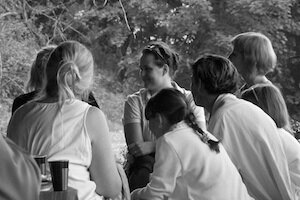On “Family Values” and Mental Health
Posted in Personal Stories By Hanners Blackthorne On August 12, 2015
We’ve all heard in the news about politicians asserting their belief in “family values,” especially those who are right-leaning. Where I’m from, our Prime Minister just sent all married couples with children a “Child Care Benefit” tax rebate. I put this in quotes, because the amount given covers, at best, about a week’s worth of child care. It is a joke, a ploy to gain votes. “Family values” is also used as a euphemism for (political) homophobia. And then there’s those on the more progressive side of the spectrum echoing the slogan “Hate is not a family value.” It is a slogan I used to subscribe to, until just a moment ago when I had an epiphany about the term.
Family values is problematic, both on the right, and the left. Why? The simple answer is that it renders worthless the value of anyone who isn’t (heterosexual and) married with children. By placing families on that pedestal, it leaves everyone else at the bottom. The obvious demographic groups affected include those living in poverty, those who have addictions, people of colour, and single parents. But this also includes all working middle class (and even super-rich) who are single, who choose not to have children, or who choose not to marry.
Studies show that heterosexual married families with children experience the highest rates of happiness, and this is irrespective of economic or social status. It’s just assumed that that is inherently why they do, that having a family causes greater happiness. But what if this assumption is wrong? My hunch is that the reason this is so is because there’s an unspoken message hidden in so-called “family values”: that if you don’t have a family, you’re worthless. The obvious conclusion this leads to is that those without families experience greater levels of low self-esteem, depression and anxiety.
I can speak personally to this. I live on disability. Though I am married, we don’t have children. I want children, and I have ever since I could discern whether I wanted children or not, which was a pretty young age, probably around the start of elementary school. While I can’t attribute all of my depression to this message of “family values”, I can say that every time I hear the term, it triggers a moment of feeling unworthy. It makes me sad that I don’t have children.
I just spent two weeks with my nieces, who are 5 and 8. And let me tell you, while I love seeing them, they can be annoying little brats sometime. The older one, especially, has a bad attitude. It’s like she’s 8 going on 15. By the end of the trip, it was a relief not to be around them any more (sorry girls, I feel guilty about it, but it’s true). So, it begs the question then: do I really want children? Or do I only want children because that is the message that has been ingrained in me, much as we are ingrained with the message that to be beautiful or healthy, we have to be thin?
I don’t have the answer to that question yet (so far I’m pretty sure that despite this experience with my nieces, I still want children of my own), but I do know that the message behind “family values” is at least part of why I want children, and it is a part of why I suffer depression.
About Author
Hanners Blackthorne
I am a web developer, and the creator of QueerMentalHealth.org. I run my own IT business. For this reason I have chosen to remain anonymous, so I have chosen the pseudonym "Hanners Ellicott-Chatham", which is a character from one of my favourite web comics, Questionable Content, by Jeph Jacques. am a trans woman who lives with Bipolar Disorder.

The was so insightful and heartfelt, thank you for this. I too feel the weight of family value privileging every time I get an email addressed to working families. I too am on disability and cannot have children because of my psychiatric conditions. The option of having a child is forever closed to me. Sometimes I feel this pain more acutely when I look at friends, relatives and frenemies baby pictures on Facebook. Other times I can comfort myself that I will go father in my chosen writing career without children. I agree though, every time I am exposed to children I alway retreat to my quiet adult solitude with a sense of thank goddess that’s not my world so perhaps it is for the best.